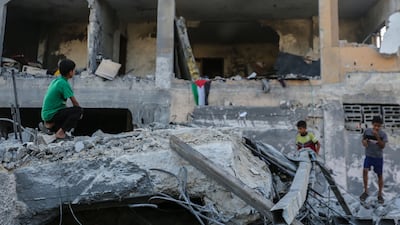According to Israel’s official sources, its military campaign in Gaza has now entered phase two, with a configuration of air, ground and special forces engaged in the Palestinian enclave. This is part of a long war, with Israel’s stated objective being to eradicate Hamas’s military and political capabilities. The focus is first on northern Gaza, but it expects to expand its operations to central and southern Gaza as well.
Hamas and other Palestinian groups claim to have repulsed Israeli ground and special forces, while Israel reports having killed Hamas leaders in Gaza and incarcerated others in the West Bank. A handful of hostages held by Hamas have returned, but militarily very little can be objectively verified. Therefore, the only conclusion to be drawn, as the conflict reaches its one-month mark, is that the battles will continue.
From a societal perspective, the enclave’s evident devastation is widespread, with more than 25 per cent of Gaza City razed to rubble. Thousands upon thousands of Palestinians have been killed and tens of thousands maimed or injured, including from the recent air raids on the Jabalia refugee camp. More than a million Palestinians have been displaced across the Strip, which only provides partial safety from intermittent air raids. Israel is pursuing collective punishment and targeting health facilities in violation of international law.
Along with many of its western allies, it has rejected calls for a ceasefire and refused to accept even a humanitarian pause. Israel has essentially deprived the sick and wounded of basic health services, with hospitals being rendered dysfunctional by the high number of patients and the lack of resources.
The situation has become so dire that several US and UN officials have resigned in protest. Numerous demonstrations have been witnessed in several western countries, countering their own governments’ positions and calling for a ceasefire in Gaza. Bolivia, Chile, Colombia and Jordan have either cut relations with or reduced the level of representation in Israel. Other countries could follow.
Regrettably, however, I foresee more pain and suffering of non-combatants before this page is turned. The only question is how many more lives will be lost and civilians injured.
The political consequences of the events of the past month are also quite significant.
It was hardly surprising that the US and most of the western world were inclined to support Israel. However, US President Joe Biden’s meeting with Israel’s recently assembled war cabinet was particularly inappropriate, and alarming, as he effectively green lighted the subsequent Israeli operations. It was not surprising, therefore, that the leaders of Egypt, Jordan and Palestine then decided to cancel their meetings with Mr Biden.
The subsequent refusal of the US and several western governments to support calls for a ceasefire, and their insistence that Israel had the right to self-defence, further affirmed the belief of a wide-ranging majority of public opinion that the West was biased and applying double standards. This was evident at the Cairo Peace Summit held shortly after hostilities broke out. This forced some Arab countries to distance themselves from their western friends.
Arab and international efforts have been made at the UN Security Council and General Assembly to generate wider public support for a ceasefire and humanitarian pause. Several western countries joined in these efforts, but the US remained in opposition. While this obvious bias will not immediately change Arab positions towards the West, there will be incremental consequences as public opinion heats up if Israel continues its relentless use of force, especially at the expense of civilians.
As the war is prolonged as projected by Israel, and the number of civilian casualties continues to mount, we are seeing an erosion of support for Israel in global public opinion, including in the western world. The traditional contemporary narrative that Israel is a small country facing existential threats from aggressive neighbours has already lost some ground and will continue to do so.

Most importantly, public opinion in the Arab world, including among those who do not support Hamas, is increasingly aggrieved by the ruthlessness of the Israeli military campaign, which justifies Palestinian deaths as acceptable collateral damage. The feelings of dismay and anger are bound to increase as the death toll keeps going up, as will growing perceptions that all this is part of a preconceived plan to evacuate Palestinians by transferring them from Gaza to the Sinai Peninsula in Egypt and subsequently from the West Bank to Jordan. Public opinion will carefully monitor Israeli actions and Arab reactions in the weeks to come, with the expectation that concrete measures will be taken at the Arab League summit in Riyadh on November 11.
There are concerns that the Gaza crisis will spill over into a wider regional conflict. There have been several cross-border incidents involving Israel, Egypt, Hezbollah and even reports of missile activity in the Red Sea, with the US targeting some Iranian sites in Syria. For now, all these appear to be contained and controlled actions rather than precursors to a regional conflict, but one should never underestimate the potential threats and risks embodied in the fog of a war that can quickly get out of hand.
Looking forward, one can only conclude that without a paradigm shift, things will only worsen as risks of spill overs increase. In essence, the status quo is politically untenable and morally unacceptable. Palestinian lives are not collateral damage, especially non-combatants. In the absence of a ceasefire or humanitarian pause, Palestinian losses will only fuel more anger against Israel and possibly even generate a greater need for personal revenge and retribution.
US Secretary of State Antony Blinken returned to the region on Friday, with behind-the-scenes diplomacy ongoing, albeit mostly regarding hostage exchange and the provision of humanitarian support. The humanitarian issues there need to be dealt with expeditiously. I therefore expect renewed efforts in the UN to deal with them more cogently in the next few days.
These issues alone, however, do not address the root causes of the Palestinian-Israeli conflict that, in essence, are existential choices of whether these two peoples will live together peacefully moving forward. Crisis management efforts need to be complemented by conflict resolution efforts on the core issue of ending Israeli occupation of Palestinian territory and the creation of a Palestinian state as part of a two-state solution. That is what will provide peace and security for all, including Israel.














































